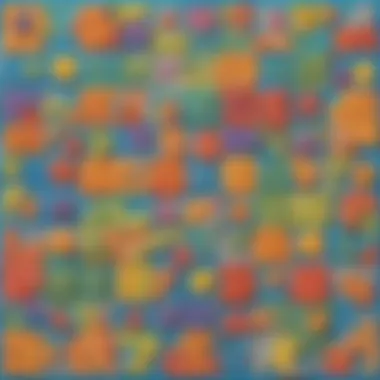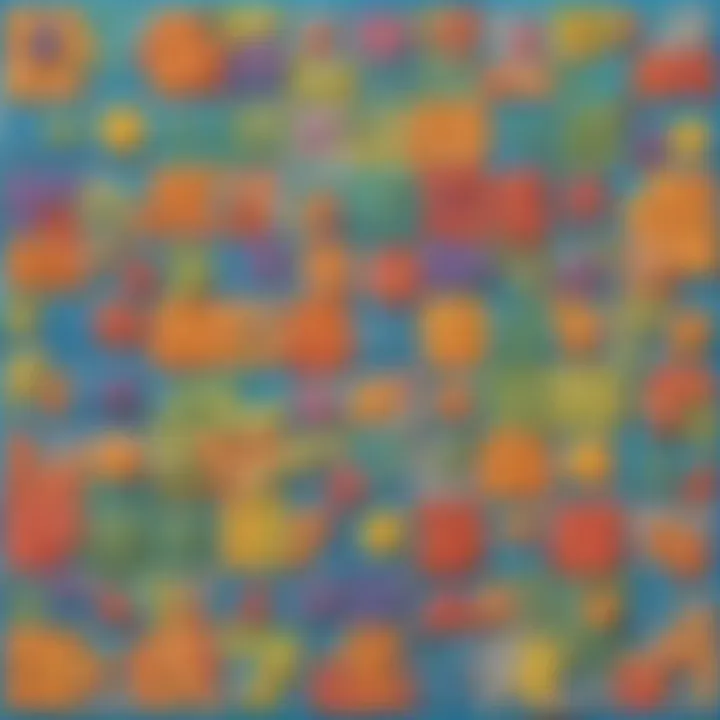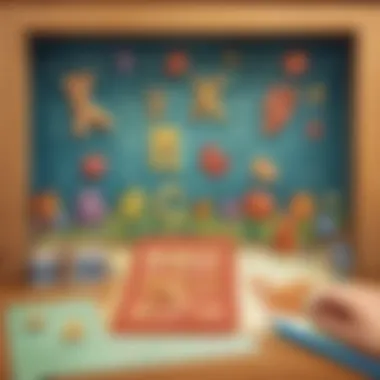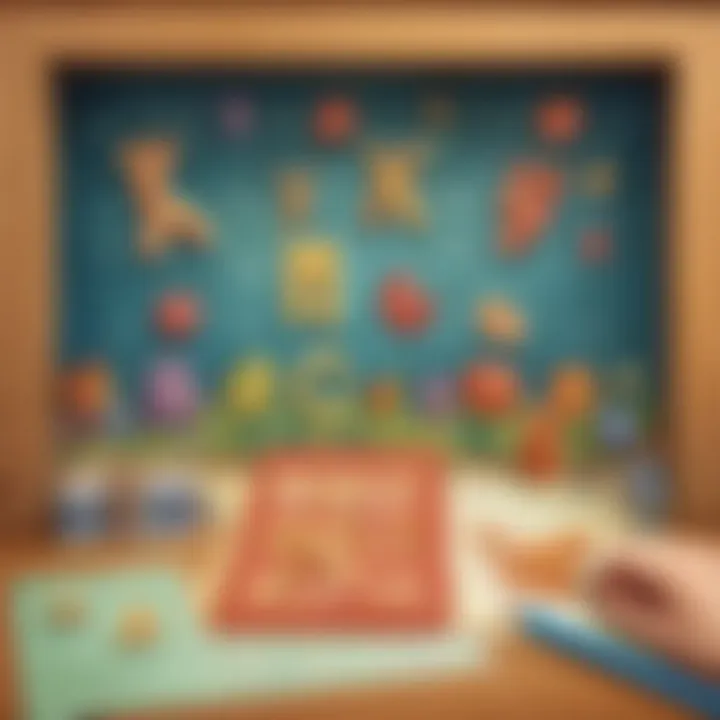Exciting Math Activities for 1st Graders: Unleash Numeracy Skills


Math Fun Facts
Lab Littles brings you a fascinating collection of math fun facts to intrigue and inspire 1st graders on their numeracy journey. Discover intriguing trivia, quirky stories, and astonishing records that will spark curiosity and foster a love for numbers!
Engaging Math Activities
Let's delve into a world of interactive math activities tailored for 1st graders. From counting games to shape recognition exercises, these activities are designed to make learning math enjoyable and educational. Get ready to dive into a realm of numerical wonder!
Math Quiz Adventure
Embark on a thrilling math quiz adventure filled with brain-teasing puzzles and interactive challenges. Test your numeracy skills with multiple-choice questions and gamified quizzes that make learning math a fun and rewarding experience. Are you ready for the math challenge?
Math Experiment Exploration
Explore the exciting world of math experiments with hands-on activities and step-by-step instructions. Dive into a world of shapes, patterns, and equations as you perform fun and engaging experiments to enhance your understanding of mathematical concepts. Get ready to unleash your inner mathematician!
Introduction
Early math education plays a crucial role in shaping young minds and building a strong foundation for future learning. In this article, we will explore a variety of engaging math activities specifically designed for 1st graders, aimed at enhancing their numeracy skills in fun and interactive ways. By introducing mathematics in a stimulating and enjoyable manner, children can develop a positive attitude towards numbers from an early age.
Importance of Early Math Education
Building a Strong Numerical Foundation
Building a strong numerical foundation is essential as it provides children with the necessary skills and knowledge to navigate more advanced mathematical concepts later on. This aspect focuses on basic arithmetic operations, number sense, and understanding numerical relationships. By establishing a solid groundwork in these fundamentals, 1st graders can tackle more complex mathematical challenges with confidence.
Enhancing Problem-Solving Skills
Enhancing problem-solving skills is a key component of early math education. This facet encourages critical thinking, logical reasoning, and creativity in approaching mathematical problems. Developing strong problem-solving abilities not only aids in math comprehension but also cultivates essential skills that are beneficial across various disciplines.
Fostering Critical Thinking Abilities
Fostering critical thinking abilities in 1st graders is paramount for their overall cognitive development. This aspect of early math education reinforces analytical skills, encourages attention to detail, and promotes innovative thinking. By nurturing critical thinking, children can engage more deeply with mathematical concepts and apply logical reasoning to real-life situations.
Target Audience
1st Graders
1st graders are at a critical stage in their academic journey where foundational math skills are introduced and refined. Tailoring math activities to suit their developmental stage can enhance their learning experience and foster a positive attitude towards mathematics. Engaging 1st graders with interactive and age-appropriate exercises can ignite their curiosity and passion for numbers.
Parents


Parents play a vital role in supporting and encouraging their children's math education. By actively participating in math activities at home and showing enthusiasm for mathematical concepts, parents can reinforce learning and boost their child's confidence in math. Involving parents in the educational process strengthens the child-parent bond and creates a conducive environment for learning.
Educators
Educators serve as guiding lights in shaping young minds and instilling a love for learning. For 1st graders, educators play a pivotal role in designing interactive math activities that captivate students' interest and cater to diverse learning styles. By implementing innovative teaching methods and incorporating hands-on experiences, educators can create a dynamic math learning environment that inspires exploration and growth.
Interactive Math Games
In this section on Interactive Math Games, we delve into the importance of incorporating such activities for 1st graders. These games play a crucial role in making math learning engaging and dynamic for young minds. By infusing elements of fun and interactivity, Interactive Math Games not only enhance numerical skills but also instill a sense of excitement towards learning. For this article, Interactive Math Games serve as a means to bridge the gap between traditional learning methods and contemporary educational approaches, catering to the specific needs of 1st graders.
Fun with Numbers
Counting Games
Counting Games are at the core of building a strong numerical foundation for young learners. These games offer a hands-on approach to mastering basic counting skills while keeping children actively engaged. Their repetitive nature aids in solidifying number sequences in a fun and interactive manner, contributing significantly to the overall goal of numeracy development. The key characteristic of Counting Games lies in their ability to transform abstract concepts into tangible experiences, making them a popular and effective choice for enhancing numeracy skills in 1st graders.
Number Recognition Activities
Number Recognition Activities play a vital role in helping children identify and differentiate between numbers with ease. Through interactive exercises and games, these activities reinforce number understanding and boost mathematical confidence. Their emphasis on visual learning techniques makes them a valuable asset in promoting numeracy skills among 1st graders. The unique feature of Number Recognition Activities lies in their ability to cater to individual learning styles, providing a personalized learning experience that fosters rapid progress in numerical literacy.
Number Patterns Exploration
Number Patterns Exploration introduces young learners to the concept of identifying and analyzing numerical sequences. By engaging in pattern recognition activities, children develop essential critical thinking and problem-solving skills. The key characteristic of Number Patterns Exploration is its capacity to enhance cognitive abilities by encouraging students to decipher and extend number patterns creatively. While these activities stimulate logical reasoning, they also pose challenges that contribute to a well-rounded math education, making them a beneficial addition to this article.
Math Puzzles
Addition and Subtraction Challenges
Addition and Subtraction Challenges offer 1st graders a hands-on approach to practising basic arithmetic operations. These puzzles not only reinforce fundamental math concepts but also enhance problem-solving proficiency. Their interactive nature makes them a popular choice for improving mathematical skills while keeping learners actively engrossed. The unique feature lies in their ability to cultivate a strategic mindset among children, encouraging them to approach math problems analytically and systematically.
Shape Sorting Puzzles
Shape Sorting Puzzles provide an innovative way for 1st graders to explore geometric concepts and improve spatial awareness. By engaging in shape recognition and categorization, children sharpen their visual discrimination skills. The key characteristic of Shape Sorting Puzzles is their capacity to promote geometric reasoning while offering a hands-on learning experience. Despite their abstract nature, these puzzles offer concrete visual feedback, aiding in the development of critical spatial skills essential for mathematical proficiency.
Logic Problems
Logic Problems challenge 1st graders to think critically and analytically while solving complex mathematical puzzles. These problems require students to apply deductive reasoning and make logical connections, enhancing their problem-solving abilities. The unique feature of Logic Problems lies in their capacity to develop higher-order thinking skills by encouraging learners to strategize and address challenges methodically. While posing mental challenges, these puzzles foster resilience and perseverance, shaping a resilient mindset crucial for navigating through mathematical obstacles.
Math Bingo
Number Identification


Number Identification in Math Bingo serves as a foundational skill-building activity for 1st graders. By engaging in number recognition exercises within a Bingo framework, children reinforce their ability to identify numbers swiftly and accurately. The key characteristic of this activity is its adaptability to cater to varying skill levels, ensuring both beginners and advanced learners benefit from the exercise. With a focus on visual and auditory cues, Number Identification in Math Bingo provides a multisensory approach to math learning, making it an innovative and effective choice for this article.
Basic Operations Practice
Basic Operations Practice in Math Bingo enhances 1st graders' proficiency in performing simple mathematical calculations. By incorporating addition, subtraction, multiplication, and division within the Bingo format, children practice fundamental operations in a playful setting. The key characteristic of this practice lies in its ability to reinforce basic math skills while promoting mental math strategies. Through repetitive practice and engagement, Basic Operations Practice hones mathematical fluency and mental agility, providing a comprehensive approach to numerical skill development.
Mathematical Concepts Reinforcement
Mathematical Concepts Reinforcement in Math Bingo offers 1st graders a platform to solidify understanding of mathematical principles through gameplay. By revisiting key concepts such as place value, fractions, and geometry in a Bingo context, children engage in meaningful learning experiences. The unique feature of this reinforcement lies in its capacity to bridge theoretical knowledge with practical application, fostering a deeper understanding of math concepts. While reinforcing foundational skills, Mathematical Concepts Reinforcement in Math Bingo cultivates a holistic approach to math education, encompassing both skill acquisition and real-world problem-solving abilities.
Experiential Learning Activities
Experiential learning activities play a vital role in this article, offering young learners the opportunity to engage with mathematics in a hands-on and immersive manner. By participating in experiential activities, 1st graders can enhance their understanding of mathematical concepts through real-world experiences. These activities not only aid in the application of theoretical knowledge but also strengthen critical thinking skills, problem-solving abilities, and overall cognitive development.
Math in the Outdoors
Nature-Based Counting
Nature-based counting brings the mathematical learning process outdoors, allowing students to connect with nature while honing their counting skills. This approach involves using natural objects like leaves, rocks, or flowers for counting exercises. The appeal of nature-based counting lies in its ability to make learning more engaging and relatable for young learners. By incorporating elements from the natural environment, children can develop a deeper appreciation for mathematics while exploring the world around them.
Measuring with Natural Objects
Measuring with natural objects introduces children to the concept of measurement using everyday items found in nature. By utilizing objects such as twigs, pebbles, or sticks for measuring lengths or quantities, 1st graders can grasp fundamental measurement principles in a tangible way. This hands-on activity not only enhances numerical understanding but also encourages exploration and experimentation in learning.
Geometry Scavenger Hunt
The geometry scavenger hunt is a creative way to introduce geometric shapes and concepts in an outdoor setting. Children are tasked with identifying and locating various shapes in their environment, such as squares, circles, triangles, and more. This activity promotes spatial awareness, shape recognition, and problem-solving skills. Through the exploration of geometric shapes in a real-world context, students can deepen their understanding of geometry in a fun and interactive way.
Math DIY Projects
Building 3D Shapes
Building 3D shapes through do-it-yourself projects offers 1st graders a hands-on experience in exploring spatial concepts. By constructing shapes like cubes, pyramids, and prisms using everyday materials like craft sticks or playdough, children can visualize three-dimensional figures and understand their properties. This hands-on approach to learning enhances spatial reasoning skills and fosters creativity in mathematical thinking.
Mathematical Art Creations
Mathematical art creations combine mathematical concepts with artistic expression, allowing children to create visually appealing works while learning fundamental math principles. By incorporating geometric patterns, symmetry, and other mathematical ideas into their artwork, students can discover the inherent beauty and harmony in mathematics. This creative outlet not only reinforces mathematical concepts but also nurtures a sense of creativity and innovation in young learners.
Fraction Pizza Making
Fraction pizza making is a deliciously educational activity that introduces children to the concept of fractions through a hands-on and interactive experience. By dividing pizza slices into equal parts and discussing fractional values, 1st graders can grasp the basics of fractions in a fun and engaging way. This activity not only reinforces fraction concepts but also enhances teamwork, communication, and problem-solving skills in a culinary setting. Overall, experiential learning activities like these offer 1st graders a unique and enriching approach to math education, cultivating a love for numbers early on.


Educational Resources
Educational resources play a pivotal role in supplementing the learning journey of 1st graders. In this article, they serve as indispensable tools to enhance mathematical skills and foster a love for numbers. By providing access to diverse learning materials, educational resources cater to the varied learning styles of young learners. Parents, educators, and children benefit from these resources as they offer a structured approach to teaching and reinforce concepts taught in a fun and engaging manner. Considering the importance of early math education, these resources act as catalysts, igniting curiosity and enthusiasm for mathematics in young minds.
Online Math Tools
Math Websites for Kids
Math websites tailored for kids offer a digital platform that combines education and entertainment seamlessly. These websites feature interactive games, puzzles, and activities designed specifically to cater to the learning needs of young learners. Utilizing colorful visuals and engaging gameplay, math websites make learning fun and captivating, promoting active participation and knowledge retention among children. The structured nature of these websites ensures a progressive learning experience, building upon core mathematical concepts while keeping children motivated and eager to explore further.
Interactive Math Apps
Interactive math apps present a dynamic way to engage 1st graders in learning mathematical concepts. These apps offer a hands-on approach to education, promoting interactivity and exploration. With features such as quizzes, challenges, and rewards, interactive math apps enhance problem-solving skills and critical thinking abilities in children. The gamified nature of these apps entices young learners, making the learning process enjoyable and immersive.
Virtual Manipulatives
Virtual manipulatives provide a digital platform for children to interact with mathematical objects and concepts. These manipulatives simulate real-world math tools, such as counters, base-ten blocks, and geometric shapes, allowing children to visualize and experiment with abstract mathematical ideas. Through virtual manipulatives, 1st graders develop spatial awareness, mathematical reasoning, and concept mastery. The hands-on nature of virtual manipulatives enhances the learning experience, making complex mathematical concepts more accessible and comprehensible for young learners.
Printable Math Worksheets
Addition and Subtraction Practice
Addition and subtraction practice worksheets offer structured exercises to consolidate numerical operations for 1st graders. These worksheets reinforce fundamental math concepts, such as arithmetic operations, number sense, and problem-solving skills. By providing a step-by-step approach to practicing addition and subtraction, these worksheets enhance mathematical fluency and accuracy in young learners. The varied formats and levels of difficulty in these worksheets cater to individual learning needs, allowing children to progress at their own pace while building a strong numerical foundation.
Money Math Exercises
Money math exercises introduce 1st graders to the practical applications of mathematics through the context of financial literacy. These exercises cover topics such as counting coins, making change, and understanding the value of money. By engaging with real-life math scenarios, children develop essential math skills while learning the significance of money management. Through hands-on activities and problem-solving tasks, money math exercises promote critical thinking, decision-making, and financial awareness in young learners.
Time Telling Worksheets
Time telling worksheets provide 1st graders with opportunities to practice reading and interpreting analog and digital clocks. These worksheets focus on developing time-telling skills, understanding the concept of hours, minutes, and seconds, and solving time-related problems. By engaging in time-telling activities, children enhance their logical reasoning, spatial awareness, and sequential understanding. The visual representation of time on worksheets facilitates comprehension and application of time concepts in real-world scenarios, nurturing a strong foundation in time management and temporal concepts for young learners.
Conclusion
In the culmination of this insightful article on Math Activities for 1st Graders, it becomes evident that fostering a love for math at an early age is a critical component of a child's educational journey. By engaging young learners in interactive and enjoyable math experiences, we set a strong foundation for their future mathematical growth. The significance of this conclusory section lies in emphasizing the lifelong benefits that a positive math experience can impart on a child's academic development. Through the exploration of diverse mathematical activities and resources, we aim to instill a genuine passion for numbers in 1st graders, setting the stage for their continued success in the realm of mathematics.
Nurturing a Love for Math
Encouraging Mathematical Curiosity
Within the realm of nurturing a passion for math, 'Encouraging Mathematical Curiosity' stands out as a pivotal aspect. This approach focuses on stimulating children's inquisitive nature towards mathematical concepts, urging them to explore and question the arithmetic world around them. By nurturing this curiosity, young learners develop a deep-rooted interest in numbers and problem-solving, laying a solid groundwork for their mathematical endeavors. The unique characteristic of 'Encouraging Mathematical Curiosity' lies in its ability to spark a sense of wonder and exploration in children towards the realm of mathematics, thereby enhancing their cognitive development and analytical skills.
Making Math Enjoyable and Accessible
'Making Math Enjoyable and Accessible' plays a crucial role in ensuring that young learners view mathematics as an engaging and approachable subject. By incorporating fun and interactive elements into math activities, children are more likely to develop a positive attitude towards numerical tasks. This key characteristic fosters a sense of enjoyment and comfort with mathematical concepts, making learning a pleasurable experience rather than a daunting one. The unique feature of 'Making Math Enjoyable and Accessible' is its ability to create a conducive learning environment where children feel confident to explore and experiment with numbers, thereby paving the way for a deeper understanding and appreciation of math.
Setting a Foundation for Future Learning
When considering the importance of 'Setting a Foundation for Future Learning' in the context of this article, we acknowledge its role in establishing a solid base for children's ongoing mathematical education. By laying down fundamental math skills and concepts early on, we equip young learners with the necessary tools to tackle more advanced mathematical challenges in the future. The key characteristic of 'Setting a Foundation for Future Learning' lies in its potential to scaffold a child's mathematical knowledge progressively, ensuring a smooth transition towards higher levels of numeracy. The unique feature of this approach is its long-term impact on a child's mathematical proficiency, setting the stage for continued growth and development in the subject.







